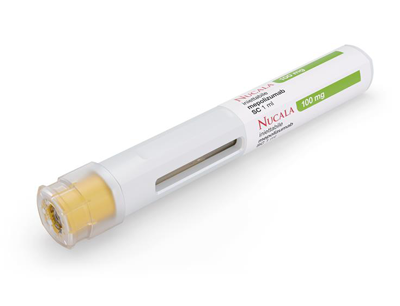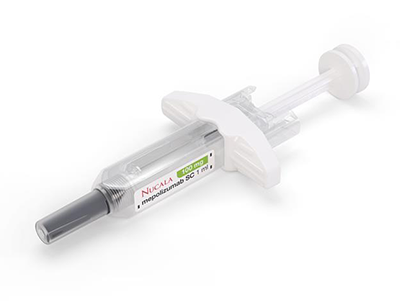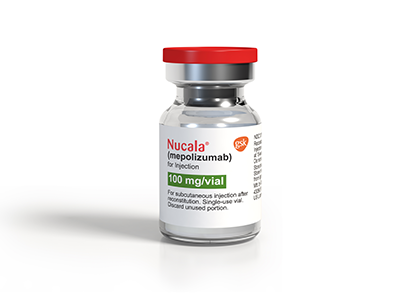CRSwNP (Chronic Rhinosinusitis with Nasal Polyps) – Dosing & administration
Nucala is a once-monthly biologic with a fixed-dose treatment for your patients with nasal polyps1
Add-on therapy with intranasal corticosteroids for the treatment of adult patients with severe CRSwNP for whom therapy with systemic corticosteroids and/or surgery do not provide adequate disease control.1
The recommended dose of mepolizumab is 100 mg administered SC once every 4 weeks.1
Pre-filled pen


AT HOME
PRE-FILLED PEN
Pre-filled syringe


IN HOSPITAL
PRE-FILLED SYRINGE
Lyophilised powder


IN HOSPITAL
POWDER FOR SOLUTION
Nucala as pre-filled pen or syringe may be self-administered by the patient or administered by a caregiver if their healthcare professional determines that it is appropriate, and the patient or caregiver are trained in injection techniques. For self-administration the recommended injection sites are the abdomen or thigh. A caregiver can also inject Nucala into the upper arm.
SELECTED SAFETY INFORMATION
Warnings/Precautions: Should not be used to treat acute asthma exacerbations. Patients should be instructed to seek medical advice if their asthma remains uncontrolled or worsens after starting treatment. Abrupt discontinuation of corticosteroids after initiation of mepolizumab treatment is not recommended.
Allergic reactions: Acute and delayed systemic reactions, including hypersensitivity reactions, have occurred following administration of mepolizumab. Patients should be instructed to seek medical attention immediately if allergic reactions occur. In the event of a hypersensitivity reaction, appropriate treatment as clinically indicated should be initiated.
Parasitic infections: Pre-existing helminth infections should be treated before starting therapy. If patients become infected whilst receiving treatment with mepolizumab and do not respond to anti-helminth treatment, temporary discontinuation of therapy should be considered.
Organ-threatening or life-threatening manifestations of EGPA and HES: Has not been studied
Adverse reactions: In clinical studies in patients with severe refractory eosinophilic asthma and EGPA, headache, injection site reactions and back pain were the most commonly reported adverse reactions during treatment. In patients with CRSwNP: Headache and back pain. In patients with HES: Headache, urinary tract infection, injection site reactions and pyrexia.
Need more information?
SC, subcutaneous
References
Nucala is a trademark of the GSK group of companies
PM-NO-MPL-WCNT-230005 June 2023








